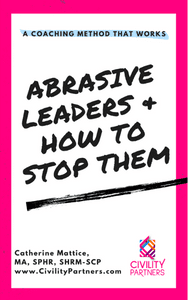We’ve all worked with a toxic person, or perhaps even a toxic CEO. Maybe they were a downer with all of their push back and refusal to budge, or a one-upper who engaged in grandstanding and stealing your thunder, or perhaps they were too aggressive with all the yelling and abrasive body language.
Unfortunately, these behaviors are toxic to individuals at the receiving end, to the team’s ability to perform, and to the organization as a whole.
How do you define a toxic CEO?
Toxic behaviors are any behaviors that are harmful and pervasive. Toxic is perhaps synonymous with poisonous, and if we think about how poison plays out on Forensic Files, it’s often a slow, insidious process occurring over time (don’t judge me), as is toxic behavior at work.
A CEO publicly shaming someone who made a mistake one time stinks, but it’s not toxic. A CEO who regularly shames people in public and private, however, is toxic as it slowly chips away at individuals’ self-esteem, confidence in themselves, and loyalty to the company.
People start seeking new jobs, talking badly about the organization in and outside of work, and perhaps seek justice by working less hours or putting less effort into their work quality. (Sidenote, reducing effort is an example of counterproductive work behavior and the research is clear that most people engage in it to regain perceived fairness. This is part of the unseen costs of toxic workplace behaviors and culture. Check out my LinkedIn Learning course on Practicing Fairness as a Manager to learn more. We made it free for 24 hours so you can view it!)
Now I’ve seen some blog posts lately cautioning about the use of the word toxic when describing someone at work or your work culture, but I disagree with those authors wholeheartedly. If people are being hurt, then it’s toxic as far as I’m concerned. And, if we use euphemisms (e.g., unhealthy, impolite, unprofessional) to talk about these behaviors, we hide the harsh reality of the damage these behaviors cause.
How do you deal with a toxic CEO?
First, recognize that they have no idea that they are causing so much damage. I know when you’re at the receiving end of toxic behavior it sure feels intentional, but as someone who’s been researching, publishing and consulting on toxic behavior for almost 15 years I can tell you that despite the occasional narcissist I come across in my coaching practice, it is not.
In coaching, I interview up to 15 people about their perceptions of their toxic CEO, and when I deliver that feedback my coaching clients are mortified and horrified. They knew people found them frustrating and hard core, but they did not know the extent of the damage they were causing.
Second, decide that you will not tolerate the toxic behavior any longer. Yes, the power to get back your power is in your hands. In a book of stories I collected and published in partnership with the National Workplace Bullying Coalition, we discovered that those who defined their experience of surviving workplace bullying as successful were those who had a defining moment of clarity – they decided to take back control.
What that looked like for each individual was different, but it was the decision, not the action that followed, that was consistent across all of the stories. One woman, for example, decided she was going to stay at the organization and fight the good fight for herself and the thousands of others who would follow in her footsteps. Another woman dramatically dropped her pile of building keys on her boss’ desk as she said, “I quit,” and then she turned and walked out the door.
Yet both of these women described themselves as successful. Check out this article for more tips on resilience.
Third, hold true to your boundaries and values. Set boundaries with your CEO, and hold to them. Let him or her know that when you receive a nasty email, you will not be responding to it; when they yell at you in front of others, you will walk away; and when they degrade you in a condescending tone, you will hang up the phone.
I know this sounds difficult and I don’t discount the courage this takes. And, you have the right to work with someone who treats you with respect. It is indeed your basic human right to feel valued and included, and what I’ve found over the years is that the earlier you set these boundaries the more likely the behavior is to stop. You even gain respect from the toxic CEO if you step up early enough, because they recognize you don’t take BS and they are no-BS kind of people.
In the end, if your workplace doesn’t treat your dignity with the tender-loving care it deserves then you’ve gotta go. Plenty of companies in the world recognize the importance of treating their people well, so perhaps it’s time to work for one of those.
Can toxic CEO’s change?
Yes, with the right coach. If you’d like to learn more about our coaching program designed specifically for abrasive, aggressive or toxic leaders, snag our ebook, Abrasive Leaders & How to Stop Them: A Coaching Method that Works.




